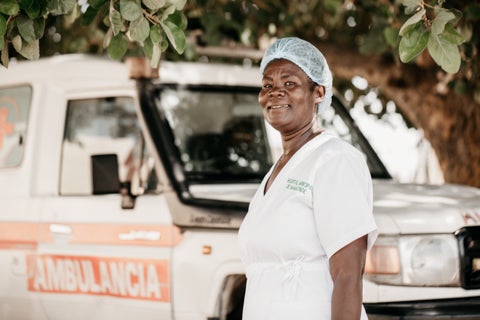Updates
How technology is improving the quality of maternal health care in drought-affected Angola
22 Feb 2023
Updates
22 Feb 2023
NAMACUNDE, Angola – "It's a source of pride to be able to accompany a pregnant woman from the first consultation to the delivery. It's so beautiful!” responds Leonor Teles Daniel when asked why she chose to be a nurse.
Leonor lives in Cunene, one of Angola's most drought-affected provinces. She works as a nurse at the municipal hospital of Namacunde. The region has known the worst drought in 40 years, which has increased the risk of maternal and newborn mortality, as well as sexually transmitted infections, early pregnancies and gender-based violence. To meet women’s and girls’ most immediate needs in the region, hospitals like Namacunde need to be equipped with sufficient tools and resources to address these risks, and improve the quality of services, especially in maternal and sexual and reproductive health.
In Angola, the second largest country in sub-Saharan Africa, two thirds of the population is under 25. The maternal mortality rate stands at 239 deaths per 100,000 live births, the main causes being the barriers women and girls face in seeking and receiving healthcare, and the lack of adequate obstetric and neonatal care. Angola has one of the highest teenage pregnancy rates in the world, and many pregnant women who have to make these crucial decisions are often girls, who struggle to access contraceptive information and services.

Over the last two years, UNFPA and the World Bank have supported the Ministry of Health of Angola in implementing a project that has launched several interventions to strengthen health systems and resources, and improve the quality of care in maternal and sexual and reproductive health in the four provinces of Cunene, Namibe, Huíla and Cuando Cubango.
The programme included the training of health professionals in obstetric and neonatal emergencies, with the introduction of new technological tools to improve the quality of care, equipment, and conditions. The objective is to strengthen the quality of care locally so that births and consultations can take place on-site, and do not have to be transferred to remote areas. Health technicians were also given technical training to respond to young people and adolescents’ special needs.
Leonor Daniel and her colleague Olga Dos Santos, a nurse in Humpata, in the province of Huilga, who faces similar challenges as Leonor, are among the 240 health professionals who were able to receive obstetric care training through the program. "Before, we worked without rules, but since the training, I have learned how to deal with pregnant women correctly,” says Leonor Teles Daniel.
As part of the initiative to strengthen health workers' response, the Government of Angola, in partnership with UNFPA and the Maternity Foundation, launched a Parto Seguro (“safe delivery”) mobile application that provides health professionals with information about all stages of childbirth and gives health practitioners concrete information to respond to all maternal health scenarios and complications that may arise. Since their training, both Leonor and Olga have been using the app.
After the launch of the app, community agents and midwives in rural areas will be trained to help women overcome local dialect and language barriers, so they feel safe reaching out to the nearest health units. The Safe Delivery app is expected to support over 50,000 births in Cunene province and close to 55,000 in Huila province over one year.
"Before the application, we used to transfer all cases of complicated deliveries to the central maternity hospital,” said Olga dos Santos. “Today, we apply the knowledge we learned with the help of the application and only transfer the cases that require more complex care”.
A version of this story was first published at UNFPA Angola.